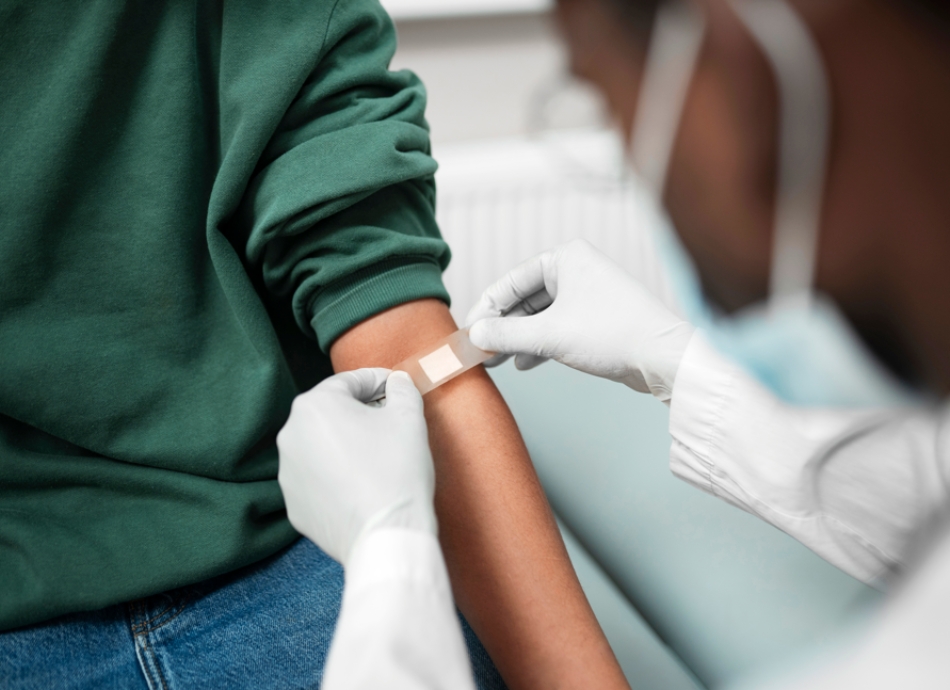You can now add Healthify as a preferred source on Google. Click here to see us when you search Google.
C-reactive protein test
Also called the CRP test
Key points about the C-reactive protein test
- The C-reactive protein (CRP) test is a blood test used to check for the presence of inflammation or infection in your body.
- C-reactive protein (CRP) is a protein made by your liver and released into your blood in response to inflammation.
- It plays an important role in the immune process.

C-reactive protein (CRP) is a protein made by your liver and released into your blood in response to inflammation. It plays an important role in the immune process.
The CRP test measures the level of C-reactive protein (CRP) in your blood. The level of CRP increases if you have an infection such as pneumonia or when you have certain autoimmune diseases that cause inflammation, such as arthritis, or inflammatory bowel disease (eg, Crohn's disease or ulcerative colitis). A more sensitive version of the test, called high-sensitivity C-reactive protein (hsCRP) test, is used (in combination with other health information) to assess your risk of heart disease.
The serum CRP level in a ‘healthy’ person is usually less than 5 mg per L. This will begin to rise 4 to 8 hours after tissue is damaged. It peaks within 24 to 72 hours and returns to normal 2 to 3 days after the inflammation or infection has stopped.
There are 2 main purposes of CPR testing.
To diagnose and monitor inflammation
The CRP test can be used to check for inflammation in your body. It is requested if your healthcare provider suspects you might have an inflammatory disorder. It doesn't show what's causing the inflammation or where the inflammation is located. It's requested for diagnosis and monitoring.
Diagnosis
- To check whether you have an inflammatory condition such as arthritis, inflammatory bowel disease, other autoimmune disorders
- To check your risk of heart disease with a hsCRP test.
Monitoring
- If you have already been diagnosed with an inflammatory disorder, to monitor the disease and see how well your treatment is working. If your treatment is working well, and the inflammation lessens, the level of CRP in your blood will drop.
To diagnose and monitor infection
- If you have symptoms of an infection in your chest or airways (upper respiratory tract infection) such as dry cough, sore throat, runny nose and sneezing, your healthcare provider may perform a CRP test to decide whether or not to prescribe antibiotics.
- Infection caused by bacteria results in a bigger increase in CRP compared with infections caused by viruses. Antibiotics are only effective against infections caused by bacteria and are not effective against infections caused by viruses.
You don't need to do anything before having this test, unless it's combined with a test being done for another reason. Your healthcare provider will advise you on this. The CRP test can be done at any time of the day.
Regular CRP test
A regular CRP test is usually done at your local blood collection center, or in hospital if you’re an inpatient. An elastic band is wrapped firmly around your upper arm. This helps the veins below expand, making it easier to draw blood from. The injection site is cleaned with an alcohol swab before a needle is inserted into your vein.
You may feel nothing at all from the needle, or you may feel a small brief sting or pinch. The blood sample is collected in a tube, which is sent to the laboratory for analysis.
Point-of-care CRP test
Rarely, your healthcare provider may perform a CRP test in their surgery. This is called a point-of-care CRP test. This is a finger-prick blood test where your healthcare provider will gently prick and squeeze your finger for a small blood sample.
The blood sample is collected in a tiny tube, which is analysed by a portable machine in the surgery. The results of the point-of-care CRP test are available within a few minutes.
On its own, a CRP test rarely provides a diagnosis, but it may can confirm the presence of inflammation or infection. An increasing or high amount of CRP in your blood suggests acute inflammation or infection. As the inflammation or infection gets better, your CRP levels will drop.
However, if your test results show a high or low level, it doesn't always mean there is infection or inflammation or conversely that there is no infection or inflammation. What the results mean depends on your own health and situation as the results can be affected by a number of different factors such as your immune system, medications, age, size and other health conditions. Your healthcare provider needs to look at your results together with other information about you to understand what they mean.
The following links have more information on the CRP test. Be aware that websites from other countries may contain information that differs from New Zealand recommendations.
Blood test safety information(external link) Awanui Labs, NZ
C-reactive protein(external link) PathologyTests Explained, Australia
Blood tests to detect inflammation(external link) Patient Info, UK, 2024
C-reactive protein (CRP)(external link) Testing, US
What is a C-reactive protein(external link) Health Direct, Australia, 2025
Apps
Joint and bone health apps
Digestive health apps
References
Is point-of-care CRP testing useful in guiding antibiotic prescribing in patients with respiratory tract infections?(external link) BPAC, NZ, 2015
Llor C, Plate A, Bjerrum L, et al. C-reactive protein point-of-care testing in primary care-broader implementation needed to combat antimicrobial resistance(external link) Front Public Health. 2024;12:1397096
Singh B, Goyal A, Patel BC. C-reactive protein – clinical relevance and interpretation(external link) StatPearls, NIH, US, 2025
Credits: Healthify editorial team. Healthify is brought to you by Health Navigator Charitable Trust.
Reviewed by: Dr Grace Lee, FRNZCGP and Clinical Educator
Last reviewed:





